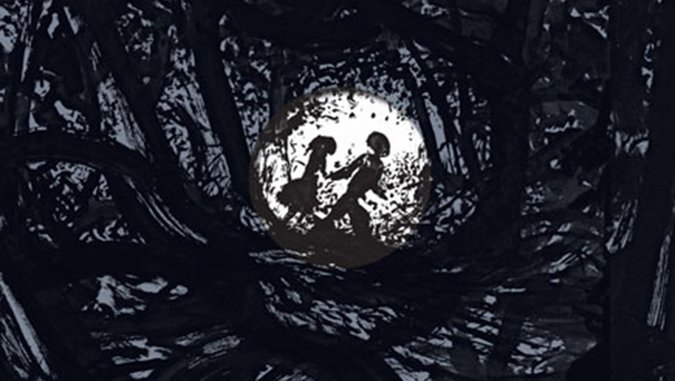The tale of Hansel and Gretel is one of the more stark, psychologically revealing Grimm tales. A brother, Hansel, and his sister, Gretel, during a time of famine, are abandoned by their parents, at the behest of their stepmother, in the woods to fend for themselves. Out of desperation and fear, they manage to leave a trail of stones that leads them back home, only to be taken back to the forest, then abandoned once again. This time, their trail consists of breadcrumbs, which of course is eaten by wild animals.
Alone, vulnerable, and hungry, Hansel and Gretel wander until they discover a house “built of bread, and roofed with cakes; and the window was of transparent sugar.” After eating their fill, the children are tricked into entering the house, whereupon a witch holds them captive in an attempt to fatten Hansel up, with the help of Gretel, so she can feast upon him. Using her wits, Gretel pushes the witch into the fiery oven, thus ending their nightmarish imprisonment. Eventually, Hansel and Gretel find their way back home and are reunited with their father, this time minus their stepmother, who has mysteriously perished.
Historically speaking, there are some obvious themes. It was not uncommon to abandon children in medieval times if the parents feared the whole family would starve as a result of trying to feed them. In fact, the historical roots are even more macabre than the story itself. According to Joseph A. Williams, a professional librarian and author of Seventeen Fathoms Deep and The Sunken Gold, the “. . .true story of Hansel and Gretel goes back to a cohort of tales that originated in the Baltic regions during the Great Famine of 1314 to 1322.”
Because of this famine, argues Williams “ . . .elderly people chose voluntarily to starve to death to allow the young to live. Others committed infanticide or abandoned their children. There is also evidence of cannibalism.”
As gruesome as this is, the reality is often darker than our most vivid nightmares, as Mao’s great famine is a dark reminder of our not-so-distant past. Humankind, at times, seems relentless in its pursuit of evil deeds at the expense of others, including those they love. This is the suffering that the philosopher Friedrich Nietzsche wrote about in Will to Power, his great, unfinished work that many consider the heart of his philosophy. Nietzsche writes:
“It is suffering that inspires these conclusions: fundamentally they are desires that such a world should exist; in the same way, to imagine another, more valuable world is an expression of hatred for a world that makes one suffer: the ressentiment of metaphysicians against actuality is here creative.”
Still, people are often transcendent in nature, rising above their circumstances, no matter how dire. Whether it was Oskar Schindler, the German industrialist and a member of the Nazi Party who is credited with saving the lives of 1,200 Jews during the Holocaust by employing them in his enamelware and ammunitions factories, or Martin Luther King Jr., who willingly gave his life as a means to stem the evil of racism, people have taken grave chances to improve the lot of others. This “heroic leap” is the final sign of spiritual, psychological, and emotional maturity, a theme that is embedded in the actions of the children.
It begins with Hansel, who used his shrewdness to gather flint stones that he scattered to form a trail that led Hansel and Gretel back to their home. And though Gretel feared the worse, Hansel showed tremendous strength and resolve, saying, “Be easy, dear little sister, and go to sleep quietly; God will not forsake us.” Hansel’s actions show a sense of protectiveness for his sister’s well-being, a commentary on his nascent maturation and expanding senses of moral development.
Gretel’s actions also symbolize her emergence into adulthood. Rather than submitting to the witch’s will, Gretel pushes her into the oven, thus vanquishing the evil embodied in the witch: “Then Gretel gave her a push, so that she went in farther, and she shut the iron door upon her, and put up the bar. Oh how frightfully she howled! but Gretel ran away, and left the wicked witch to burn miserably.”
This was a risky maneuver on Gretel’s part. She could have stalled for time and sacrificed her brother in the hope that she could eventually escape her plight. Instead, Gretel summoned the courage she needed to transform a dangerous situation into one of opportunity.

In doing so, Gretel is changed in an almost alchemical transmutation from a child to an adult, initiating, much like her brother, a deep psychological process known as individuation, a concept explored by great minds such as Carl Gustav Jung, Gunther Anders, Gilbert Simondon, Bernard Stiegler, Friedrich Nietzsche, and Arthur Schopenhauer.
Individuation is crucial to our development as mature human beings and provides the psychological foundation needed for full autonomy as an adult. Without individuation, people remain forever dependent upon parents, or others who take on the role of parents.
Murray Stein, Ph.D., a training analyst at the International School for Analytical Psychology in Zurich, Switzerland, argues, ”The principle of individuation defines the essence of the human. It is absolutely fundamental to human beings to distinguish themselves from their surroundings. This is the essential nature of individual consciousness: to be itself, it must create distinctions and separateness. It is in accord with human nature, therefore, to seek individuation. Individuation is not optional, not conditional, not subject to vagaries of cultural differences. It is essential.”
From this perspective, those that do not individuate fail to become full human beings capable of self-directed behavior, leading to a state of prolonged arrested development in which our psychological and emotional maturation is significantly stalled, delaying the crucial process of individuation. This ongoing delay then leads to a host of negative behavior patterns, including codependency. As Dr. Charles L. Whitfield, a psychiatrist in private practice specializing in assisting survivors of childhood trauma with their recovery writes in his book, Co-Dependence: Healing the Human Condition, “Codependence is a disease of lost self-hood. It can mimic, be associated with, aggravate, and even lead to many of the physical, mental, emotional, or spiritual conditions that befall us in daily life.”
Even the final test of Hansel and Gretel’s physical journey parallels their inward psychological odyssey. Before they can complete their trip back home to be reunited with their father, Hansel and Gretel must cross a body of water. At first, they consider giving up, but pushing forward with her process of maturation, Gretel calls upon a duck to ferry them across the water:
Duck, duck, here we stand,
Hansel and Gretel, on the land,
Stepping-stones and bridge we lack,
Carry us over on your nice white back.
And although Hansel wishes to cross the water together, Gretel understands on a deeper level that some things need to be accomplished individually, saying, “that would be too hard upon the duck; we can go separately, one after the other.” This sudden insight on the part of Gretel is emblematic of her transformation from child to adult, adding another important piece to the puzzle that is individuation.
In this sense, the children’s trek through the forest is emblematic of their inner journey to individuation. For when they are faced with the suffering of abandonment and the looming specter of their own death, they do not despair, but instead, conjure the inner robustness and determination to do something positive and constructive to change their plight.
And it is precisely their abandonment, their sense that they are all alone in the world, that forces them to take responsibility for their predicament and therefore compels their acts of courage. As Nietzsche puts it, “The higher man is distinguished from the lower by his fearlessness and his readiness to challenge misfortune.” Perhaps this is what Frost meant when he wrote:
The woods are lovely, dark and deep,
But I have promises to keep,
And miles to go before I sleep
It is also worth noting that at the conclusion of the tale, as they are reunited with their father, Hansel and Gretel share the “pearls and precious stones” they took from the witch upon their literal and psychological emancipation, thus rescuing them from the clutches of a lifetime of poverty.
Beyond the materialistic rewards, Hansel and Gretel share their ultimate treasure, their individuation, a treasure that will allow them to live “in great joy together,” or separately, which we must all eventually do, because the greatest danger, perhaps, is the failure to do so. I’ll leave you with the words of Carl Jung: “The only meaningful life is a life that strives for the individual realization — absolute and unconditional— of its own particular law … To the extent that a man is untrue to the law of his being … he has failed to realize his own life’s meaning.”
At Newsweed.com, we adhere to three simple principles: truth, balance, and relatability. Our articles, podcasts, and videos strive to present content in an accurate, fair, yet compelling and timely manner. We avoid pushing personal or ideological agendas because our only agenda is creating quality content for our audience, whom we are here to serve. That is why our motto is ”Rolling with the times, straining for the truth.”
Your opinion matters. Please share your thoughts in our survey so that Newsweed can better serve you.
Charles Bukowski, the Los Angeles beat poet that captured the depravity of American urban life once said, “There is something about writing poetry that brings a man close to the cliff’s edge.” Newsweed is proud to stand in solidarity and offer you a chance to get close to the cliff’s edge with our first Power of Poetry Contest. Are you a budding bard, a versatile versifier, a rhyming regaler? Do you march to the beat of iambic pentameter, or flow like a river with free verse? If so, here’s your opportunity to put your mad poetic chops to the test. Enter our poetry contest for bragging rights and an opportunity to win some cash!






